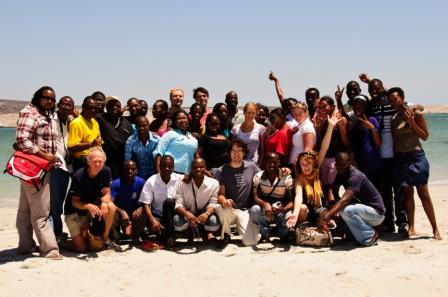
At the recent Applied Centre for Climate and Earth System Science (ACCESS) “Habitable Planet Workshop” students and alumni looked at the evolution of the planet’s fauna and flora and the conditions necessary to keep the earth’s environment favourable for human occupation.
Curriculum Development Manager for ACCESS, Dr Carl Palmer notes that the workshop, which was originally conceptualised by Princeton University Professor, George Philander, arose out of a need for a not only a workshop that would interest young scientists, but also one that would cater to students who might not necessarily have a science background.
Dr Palmer says, “He proposed a workshop on climate science that using the following observations as its premise. The first is that Planet Earth is the only habitable one we know, the story of why it’s habitable is an amazing one that everyone should know.
“The second is that there is no better place in the world to tell this story than South Africa. We use South Africa’s amazingly diverse natural biological, geological, oceanographic, social and cultural landscapes as a laboratory and narrative tool to tell a story, a story that became the ten-day workshop we call the Habitable Planet”.
Dr Palmer continues, “I don’t think there is a text book that covers what we teach at Habitable Planet. You would need to combine the information in the text books for biology, geography, chemistry, physics, oceanography and many more. But more than this, even if you collected these together, you would need to distil a story about our amazing Earth and about our amazing country.
“Habitable Planet is about more than just what we teach however, it’s about linking together some of the brightest minds in South Africa from a range of disciplines and trying to tackle multidisciplinary problems in a way that’s not really happened before.”
Thandeka Kathi who completed her Joint honours in Psychology and Law through Rhodes and Leicester University (on exchange) stated that “If I had to use a word to describe the workshop it would be “indescribable”.
Lauren Biermann [The Chair] kept saying that, “One of the aims of the workshop was to awaken our curious scientific minds, especially the curiosity we used to have as children as we wondered why the sky was blue. The talks we had from geologists, physists and biologists on what makes earth habitable were amazing. Field trips to the national botanical gardens, two oceans aquarium, Cape Point and fossil park left us enchanted and deeply in awe of nature-in awe of its beauty and strength, and its vulnerability at the hands of man.”
Rhodes Masters student Lukholo Macala also had an opportunity to present his research on the interconnectedness of religion and science.
While Gcobani Qambela who completed his Joint Honours in Anthropology and Political and International Studies through Rhodes in 2010 presented a paper under the title “Climate Change/Global Warming as a gateway to re-building Carthage: Towards A South African Perspective on Climate Change”.
Dr Palmer says plans are underway to expand the workshop and run it four times a year in different locations in not only South Africa, but also in other African countries. “This year we are planning to host Habitable Planet in Pretoria, Rhodes and Namibia, with more locations the following year” he said.
The ten-day workshop was held at held at the University of Cape Town (UCT). Rhodes students and alumni, Gcobani Qambela, Lukholo Macala and Thandeka Kathi were amongst 30+ students from all over Africa selected to attend the 2011 workshop with Macala and Qambela also having the opportunity to present their papers.
Anyone interested in finding out more about the workshop can visit www.access.ac.za, visiting the facebook group http://www.facebook.com/group.php?gid=4352117413 or by contacting Dr Palmer directly cpalmer@access.ac.za
